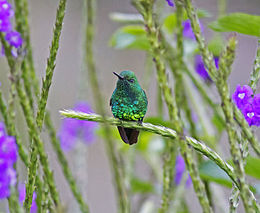Chlorostilbon assimilis
| Garden emerald | |
|---|---|
 |
|
| Resting on a blue porterweed | |
| Scientific classification | |
| Kingdom: | Animalia |
| Phylum: | Chordata |
| Class: | Aves |
| Order: | Apodiformes |
| Family: | Trochilidae |
| Genus: | Chlorostilbon |
| Species: | C. assimili |
| Binomial name | |
|
Chlorostilbon assimili Lawrence, 1861 |
|
The garden emerald (Chlorostilbon assimilis) is a small hummingbird that is an endemic resident breeder in Costa Rica and western Panama. It was formerly considered to be a subspecies of the blue-tailed emerald.
This is a species of open habitats, including bushy savanna, clearings, cultivation, and gardens. It can be found in the Pacific lowlands and hills, locally up to an elevation of 1500 m.
The nest is a neat cup of plant fibres decorated on the outside with bark fragments. The two white eggs are incubated by the female alone.
The garden emerald is 8 cm long and weighs 2.6 g. The male has bronze-green upper parts, brilliant green under parts, white thighs and a deeply forked tail. The female has grey underparts, a white stripe behind the eye and dusky ear patches. She has white tips to her tail, which lacks the deep fork of the male. Young birds resemble the adult female, but have some buff feather tips.
The garden emerald has a dry chit call, and the males song is a thin tsippy tsee tsee. Breeding males perch on open branches and may give a dive display.
These birds visit small flowers, including those ignored by other species, and will also take tiny insects. They are frequently chased off by larger hummingbirds.
...
Wikipedia

